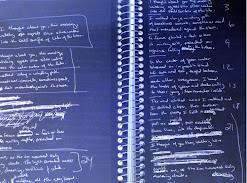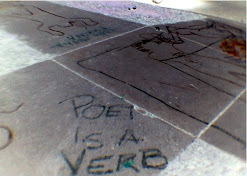I just read this memeover on Stoney Moss. Both Whirling Dervish and ...deb had some really interesting answers to the following questions, which of course, encouraged me to try it out. They originally found the meme on Poefrika, Rethabile's site. If you try it out on your own blog, be sure to leave Rethabile a comment.
1. Who's your hero? Why (Not necessarily a writer -- do not include deities or family)?
Since I just wroteabout Ani DiFranco yesterday, so I'm not choosing her, although she definitely is one of my heroes.
Other than her, I would have to say that my advisor from graduate school is one of my heroes. Deborah Keenan is a wonderful example of how a woman can be a wife, mother, poet, and teacher in an honorable and honoring way. She spends so many hours working on other people's writing, through her role as professor and theater advisor, yet still has time to raise her kids, write her poetry, and have a semblance of a life. Although I'm not sure if she would agree that it is as easy as she makes it look.
2. Who's your favourite dead poet? Which of their poem do you like best?
So many dead poets to choose from! I would have to say that Sylvia Plath has to be one of my favorite poets of all time. Not because of her dramatic life, although that is interesting, but because she was a technical genius. While I love many of her poems, I would have to say that Tulips is one of my favorites. She extends this beautiful and grotesque image of the tulips as mouths which is just haunting.
3. What well-known poet/writer have you met? What was the occasion?
I have been pretty lucky in my young adult life to meet several poets, mostly through my undergraduate school's excellent English Department. (Hooray for small hippie liberal art colleges with excellent visiting writer programs.) Two instances really stick out in my life.
First, as a junior, Denise Levertov was a visiting writer for a semester, and I took a class with her. This was maybe 6-8 months before she passed away from cancer. Not to speak ill of the dead, but she was both brilliant and terrifying.
She asked to read our poems and then met with us all individually to give us a critique. I turned in several poems, including a couple of attempts at sestinas. (I was so proud that I was able to use all 6 words at the end of each line in each stanza -- it took me days.) When I arrived to my meeting, she was mostly kind to me, until we got to the sestinas. She said, "Well, these are almost sestinas," and handed them back to me dismissively. I went home and looked up the form, only to realize that I didn't use the super special order for each of the end words; I just stuck them in when they worked. Despite her slight callousness, she taught me so much about metrics and reading poetry, that I still read back on her essays to this day.
Secondly, when I was a senior, Quincy Troupe came to a reading at our school and I was selected, along with a friend, to have dinner with him and one other student and the entire English faculty. I read his book, Avalanche, as a way to prepare. I was so knocked away by his book that I became incredibly intimidated as the time came for the dinner. During the dinner, I was dumbstruck, as was my friend. The third students monopolized the conversation, and really networked quite well, in retrospect. I only said one word to him, the entire night. Minneapolis. This was after he asked me where I was from, as we were leaving the restaurant. He commented that it was a lovely city, and that he had read at the Loft several times. That was the entire conversation.
4. How do you recognise a bad poem? What are its characteristics?
I hate to sound relativist, but I don't know if there are bad poems. Certainly, I have read and written some clunkers, filled with cliche, stilted, awkward language and mixed metaphors. However, I think that poetic expression is so fleeting these days that any attempt at elevating our language to the poetic is a risk and a challenge, and should be honored. Therefore, I will skirt the question to say that there are a) poems that don't appeal to me personally but may appeal to others, b) poems that have a burning ember of quality, covered in layers and layers of bad or sloppy language, or c) poems that have good language but not a great idea.
Recognizing the first one is easy. I can identify the qualities that make it a good poem to others (fresh language, interesting metrical tools) but I might not care for the subject or the style. I take it as a learning experience and move on, both as a writer and reader.
Recognizing the second kind is more difficult. I can see the idea, even for a fleeting second, but can be distracted from the sloppiness or poor language or convoluted imagery. When it is my own, I feel like I need to dust off the layers of thought and language, to reveal what lies beneath. Hopefully, if I can see the initial impulse for the poem, I can reconnect with the meaning and rebuild.
The third kind is my least favorite as a writer, because I can spend the most amount of time on them. I call this polishing a turd. I will take that poem, that seems to have some sort of freshness or creativity to it, and continuously rework it, in the hopes that it becomes good. It never does, because frankly, not all of my initial impulses are genius. Sometimes, I have crappy ideas. :)
5. Why are some poems entitled untitled? What's your take on that?
Personally, I like to title my poems, as a tool for the reader to add another layer of meaning. However, I hate the act of titling my poems, because it's hard. I often over-title and show my hand way too early. This is an awful habit to break.
One of my favorite all time poets, Emily Dickinson, never titled any of her poems. She either didn't need to or didn't want to, and frankly her meaning is clear without them. A title would just way them down.
From a marketing point of view, a title on a poem is a tool. It's so we don't have to say, "this is my one about..." at readings and in cover letters to journals.
Sunday, September 23, 2007
5-10 Question Meme
Posted by Jessica at 4:16 PM
Labels: Miscellaneous
Subscribe to:
Post Comments (Atom)



6 Comments:
Very nice, indeed. You met Denise? Wow.
I like the fact that your hero is a person, not a hero. Not Gandhi or Martin Luther King, but Deborah Keenan.
I like Sylvia, too. When I read some of her poems, I have to shut the book and experience the poem for a while, before continuing.
Thanks very much for trying this out.
I enjoyed your answers very much. I did my undergrad disseratation on Sylvia Plath and am a huge fan, though my favourite dead poet is definitely Gerard Manley Hopkins. I was also just introduced to Poefrika and think it's wonderful.
Rethabile,
Thanks again for the great inspirational meme! I really enjoyed being able to reflect on these answers.
Jo,
A dissertation on Plath? That must have been quite a challenge, especially as an undergrad. Hats off to your academic prowess! :)
I have never been able to get into Hopkins, unfortunately. I should probably give him a try again. In undergrad, I took at senior capstone course on prosody, and I got lost trying to analyze the whole sprung rhythm thing.
Mine's up: Rethabile
Cheers to you.
James Wright is a poet whom I wished I could have met. The man could write some fine poems !
Thoughtful answers--none I didn't agree with. I particularly enjoyed your memoir about encounters famous poets.
There is just so much to read...I am inspired by all the meme responses :-) and have a longer list now. Some old favorites to renew, some new to me.
Post a Comment